| Listing 1 - 10 of 31 | << page >> |
Sort by
|
Book
ISBN: 0226046109 Year: 1990 Publisher: Chicago London University of Chicago Press
Abstract | Keywords | Export | Availability | Bookmark
 Loading...
Loading...Choose an application
- Reference Manager
- EndNote
- RefWorks (Direct export to RefWorks)
Linguistics --- Evolutie [Menselijke ] --- Evolution humaine --- Homme--Evolution --- Human evolution --- Mens--Evolutie --- Menselijke evolutie --- Evolution --- Language --- Language and languages --- Homme --- Langage et langues --- Origin --- Origines --- Biological Evolution. --- Language. --- 800 --- -#SBIB:309H518 --- #SBIB:309H514 --- Foreign languages --- Languages --- Anthropology --- Communication --- Ethnology --- Information theory --- Meaning (Psychology) --- Philology --- Evolution (Biology) --- Physical anthropology --- Evolutionary psychology --- Human beings --- Evolution, Biological --- Sociobiology --- Taalwetenschap. Taalkunde. Linguistiek --- Verbale communicatie: sociologie, antropologie, sociolinguistiek --- Linguistiek --- Human evolution. --- Origin. --- Evolution. --- 800 Taalwetenschap. Taalkunde. Linguistiek --- Biological Evolution --- #SBIB:309H518 --- Origin of languages --- Speech --- Language and languages - Origin. --- Dialect --- Dialects
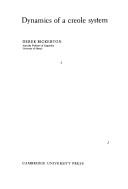
ISBN: 052120514X 9780521205146 Year: 1975 Publisher: London: Cambridge university press,
Abstract | Keywords | Export | Availability | Bookmark
 Loading...
Loading...Choose an application
- Reference Manager
- EndNote
- RefWorks (Direct export to RefWorks)
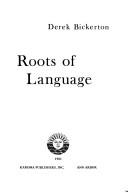
ISBN: 089720073X 0897200446 Year: 1981 Publisher: Ann Arbor, Mich. Karoma
Abstract | Keywords | Export | Availability | Bookmark
 Loading...
Loading...Choose an application
- Reference Manager
- EndNote
- RefWorks (Direct export to RefWorks)
-Creole dialects --- Creole languages --- Creolized languages --- Languages, Mixed --- Language and languages --- Language acquisition --- Acquisition of language --- Developmental linguistics --- Developmental psycholinguistics --- Language development in children --- Psycholinguistics, Developmental --- Foreign languages --- Languages --- Origin --- Acquisition --- Creole dialects --- Interpersonal communication in children --- Psycholinguistics --- Pidgin languages --- Origin of languages --- Speech --- Linguistics
Book
ISBN: 1857285417 Year: 1996 Publisher: London UCL Press
Abstract | Keywords | Export | Availability | Bookmark
 Loading...
Loading...Choose an application
- Reference Manager
- EndNote
- RefWorks (Direct export to RefWorks)
Communicatie --- Neurolinguïstiek --- Psycholinguïstiek --- Taal --- evolutie --- Communicatie. --- Neurolinguïstiek. --- Psycholinguïstiek. --- evolutie. --- Psycholinguistics --- Language and languages --- Human evolution
Book
ISBN: 9783946234081 9783946234098 9783946234104 9781523647156 3946234089 3946234100 3946234097 Year: 2015 Publisher: Language Science Press
Abstract | Keywords | Export | Availability | Bookmark
 Loading...
Loading...Choose an application
- Reference Manager
- EndNote
- RefWorks (Direct export to RefWorks)
Roots of language was originally published in 1981 by Karoma Press (Ann Arbor). It was the first work to systematically develop a theory first suggested by Coelho in the late nineteenth century: that the creation of creole languages somehow reflected universal properties of language. The book also proposed that the same set of properties would be found to emerge in normal first-language acquisition and must have emerged in the original evolution of language. These proposals, some of which were elaborated in an article in Behavioral and Brain Sciences (1984), were immediately controversial and gave rise to a great deal of subsequent research in creoles, much of it aimed at rebutting the theory. The book also served to legitimize and stimulate research in language evolution, a topic regarded as off-limits by linguists for over a century. The present edition contains a foreword by the author bringing the theory up to date; a fuller exposition of many of its aspects can be found in the author’s most recent work, More than nature needs (Harvard University Press, 2014).
E-books --- Philology. Linguistics --- Linguistics --- Language and languages --- Origin. --- Origin of languages --- Speech --- Origin --- pidgin --- creole --- language origins --- language evolution --- Semantics --- Stratum (linguistics) --- Verb
Book
ISBN: 067472853X 0674728521 9780674728523 9780674724907 0674724909 Year: 2014 Publisher: Cambridge, Mass. Harvard University Press
Abstract | Keywords | Export | Availability | Bookmark
 Loading...
Loading...Choose an application
- Reference Manager
- EndNote
- RefWorks (Direct export to RefWorks)
How did humans acquire cognitive capacities far more powerful than any hunting-and-gathering primate needed to survive? Alfred Russel Wallace, co-founder with Darwin of evolutionary theory, set humans outside normal evolution. Darwin thought use of language might have shaped our sophisticated brains, but this remained an intriguing guess--until now. Combining state-of-the-art research with forty years of writing and thinking about language origins, Derek Bickerton convincingly resolves a crucial problem that biology and the cognitive sciences have systematically avoided. Before language or advanced cognition could be born, humans had to escape the prison of the here and now in which animal thinking and communication were both trapped. Then the brain's self-organization, triggered by words, assembled mechanisms that could link not only words but the concepts those words symbolized--a process that had to be under conscious control. Those mechanisms could be used equally for thinking and for talking, but the skeletal structures they produced were suboptimal for the hearer and had to be elaborated. Starting from humankind's remotest past, More than Nature Needs transcends nativist thesis and empiricist antithesis by presenting a revolutionary synthesis that shows specifically and in a principled way how and why the synthesis came about.
Language and languages. --- Human evolution --- Language acquisition --- Cognitive grammar. --- Psycholinguistics. --- Language, Psychology of --- Language and languages --- Psychology of language --- Speech --- Linguistics --- Psychology --- Thought and thinking --- Cognitive linguistics --- Grammar, Comparative and general --- Psycholinguistics --- Acquisition of language --- Developmental linguistics --- Developmental psycholinguistics --- Language development in children --- Psycholinguistics, Developmental --- Interpersonal communication in children --- Evolution (Biology) --- Physical anthropology --- Evolutionary psychology --- Human beings --- Foreign languages --- Languages --- Anthropology --- Communication --- Ethnology --- Information theory --- Meaning (Psychology) --- Philology --- Psychological aspects. --- Psychological aspects --- Acquisition --- Origin --- Sociolinguistics
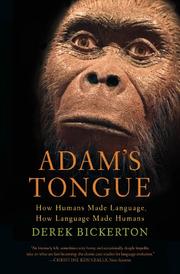
ISBN: 9780809016471 0809016478 Year: 2009 Publisher: New York, N.Y. Hill and Wang
Abstract | Keywords | Export | Availability | Bookmark
 Loading...
Loading...Choose an application
- Reference Manager
- EndNote
- RefWorks (Direct export to RefWorks)
Shows how and why previous attempts to solve that problen have fallen short. Taking cues from topics as diverse as the foraging strategies of ants, the distribution of large prehistoric herbivores and the construction of ecological niches, Bickerton produces a dazzling new alternative to the conventional wisdom.
Psycholinguistics --- Human evolution --- Language and languages --- Origin of languages --- Speech --- Evolution (Biology) --- Physical anthropology --- Evolutionary psychology --- Human beings --- Origin
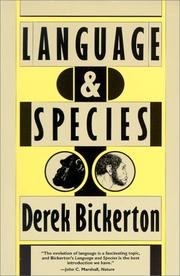
ISBN: 0226046117 9780226046112 Year: 1992 Publisher: Chicago (Ill.): University of Chicago press,
Abstract | Keywords | Export | Availability | Bookmark
 Loading...
Loading...Choose an application
- Reference Manager
- EndNote
- RefWorks (Direct export to RefWorks)
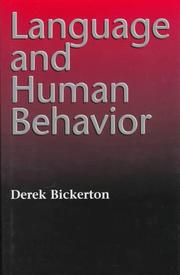
ISBN: 0295974575 Year: 1996 Publisher: Seattle (Wash.) : University of Washington press,
Abstract | Keywords | Export | Availability | Bookmark
 Loading...
Loading...Choose an application
- Reference Manager
- EndNote
- RefWorks (Direct export to RefWorks)
Book
ISBN: 0295974583 Year: 1996 Publisher: Seattle University of Washington press
Abstract | Keywords | Export | Availability | Bookmark
 Loading...
Loading...Choose an application
- Reference Manager
- EndNote
- RefWorks (Direct export to RefWorks)
| Listing 1 - 10 of 31 | << page >> |
Sort by
|

 Search
Search Feedback
Feedback About UniCat
About UniCat  Help
Help News
News